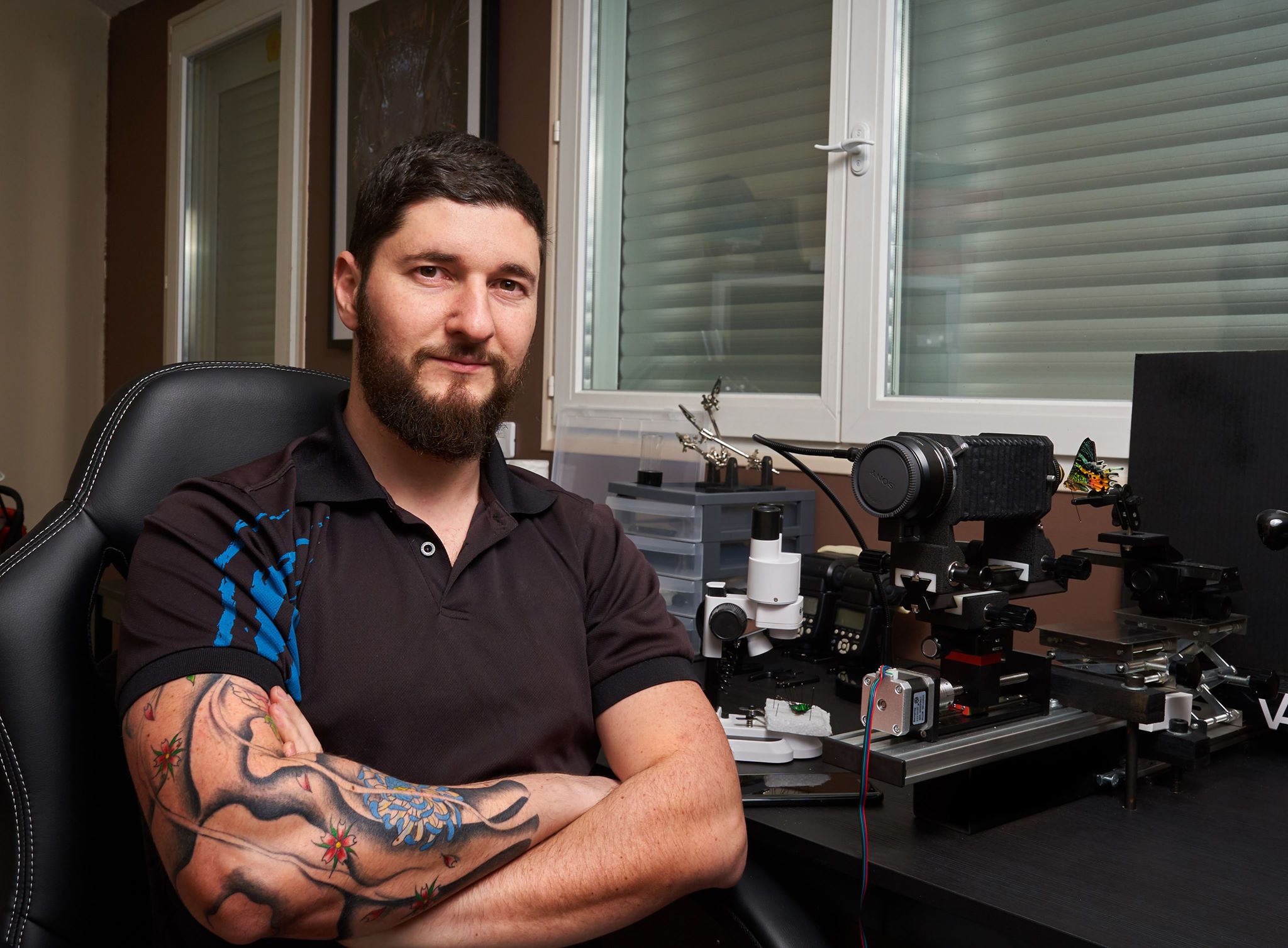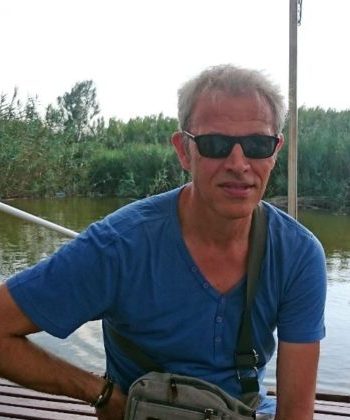Interview de David GIRON
Director of the Insect Biology Research Institute – IRBI
University of Tours
caption id=”attachment_2257″ align=”alignright” width=”210″] David GIRON – CNRS Research Officer[/caption]
David GIRON – CNRS Research Officer[/caption]
David Giron is an insect researcher at the Insect Biology Research Institute (IRBI) at the University of Tours.
Following the IRBI Research Master (2006-2008), David GIRON was one of my professors during this period.
His work and courses being exciting, I wanted you to discover his world and a profession too little known to the general public.
I thank David GIRON for this exciting interview, and for taking some of his time, very busy, to answer these questions.
-
In which laboratory do you work ?
Institute of Insect Biology Research (IRBI). It is a joint research unit (UMR) attached to the Université François-Rabelais de Tours (37) and the Centre National de la Recherche Scientifique (CNRS). We are based on the site of the Faculty of Science and Technology.
-
What are the research themes developed by the IRBI laboratories ?
We address many topics related to insects. In a global way it is a question of understanding the interactions between insects and their environment whether they are biotic interactions (with other living organisms) or interactions with the abiotic environment. We seek to understand the mechanisms that govern these interactions and their consequences in terms of adaptation, for example in the face of climate change and other anthropogenic disturbances.
Our themes address issues such as the dynamics of invasive insect populations and the mechanisms responsible for their reproductive success, or the nature and origin of associations between parasitic wasps and viruses that can be used to infect their hosts, or the aerodynamics of flight (lire cet article) and walking (lire this article) insects and their consequences for escaping predators or finally issues such as strategies for selecting sexual partners based on acoustic signals and thermoregulatory mechanisms (lire this article) used by hematophagous insects (which feed on blood).
-
What topics are you personally working on ?
I work on the interactions between insects and plants. I try to understand the molecular mechanisms used by insects to feed on plants and how these insects manage to thwart the immune defense mechanisms put in place by the plant. I use molecular biology and biochemistry tools, but also behavioural observations and physiology both in the laboratory and in the field. The insects I study are masters of manipulation and they literally take control of the plant to feed and protect themselves from predators. But they do not do this alone: they are helped by symbiotic bacteria that live within the insect’s own cells and help produce molecules that help them take control of the plant.
-
What are the paths and paths that have allowed you to work on this theme ?
In reality, I started working on insect feeding as early as my Master 1 internship, and then I continued in Master 2 then in thesis. When one is interested in the nutritional ecology of insects, one is quickly brought to be interested in plants because a large part of insects are phytophagous. So it was naturally that I came to study plants and plant-insect interactions. The work on bacteria and their role in feeding the insect came later, here again a little at random our discoveries.
-
What fascinates you about your work and why you chose this discipline and insects ?
What fascinates me is that no two days are the same. We keep asking ourselves questions and imagining experiments to answer them. It is stimulating and enriching. Every day I learn new things. Of course, it’s not always easy and international competition can be tough, but it’s a real chance to do a stimulating and fulfilling job. Moreover, it is very diversified, there is the experimental part but also the bibliographic research, the writing of articles, the conferences in the four corners of the planet, the field, the laboratory…
This discipline allows me to combine two elements that seem important to me: fundamental research that contributes to advancing knowledge and training students (researchers of tomorrow), and practical implementation to address major social issues such as reducing pesticide use, improving agricultural production for example.
-
Is studying insects a passion, a childhood dream, or rather the result of a process and encounters during your journey ?
?
Very frankly, it’s really by chance that I work on insects. It turns out that the lab where I did my first internships was specialized in insects. They would have worked on the fish, I would certainly work on the fish today. I appreciate the aesthetic side of insects, their world and their prowess fascinate me, but it remains above all a subject of study for me. What matters are the questions I can answer. I consider myself neither a naturalist nor an entomologist, but it is true that with time we fall under the charm of these little animals…
-
What did you follow as training, what is your curriculum ?
I did a classical university course. After a science degree (maths and physics), I went to college where I did what would be today a Bachelor’s degree (3 years), then a Master’s degree (2 years). At the end of this Master I obtained a thesis scholarship where I continued in a laboratory of my University. After 3 years of thesis, I went a few months to Wales to perfect my knowledge of plant physiology (in preparation for the scientific project I am currently working on), then I went for 2 years in post-doctorate in the USA near Atlanta. I then applied for the CNRS competition and got a research position on the second attempt. Since this year, after a national competition, I am research director, still at CNRS.
-
What advice would you give to young students wishing to orient themselves in entomological research? Which field and which training ?
I think that in general we should approach the University with a professional project. Of course, it can evolve, but you absolutely must have a goal, otherwise you risk seeing the years go by and miss its orientation. Initially I wanted to be a school teacher and do short studies. As it worked well, I told myself why not as a biology teacher in middle school and high school, then discovering the research aspects, I turned towards a career as a teacher-researcher. Finally, after 10 years of training, I managed to become a researcher, quite far from the initial project and my will to do short studies!
The most important thing is to train yourself to acquire tools that will be valuable in different fields. There is a difference between professional training and personal desires I think. We see too many students who stay focused on a study model, often elephants and whales! What matters is mastering tools and concepts. Then, everyone can seek to develop their skills with a specific taxonomic group, even if only secondarily. If one wishes to focus on themes that require true naturalist/entomological competence, as may be the case for systematists, one should try to train as early as possible on a particular group of organisms. The research internships will be an opportunity to give a more entomological touch to his research.
Then it is necessary to orient oneself towards Universities and Masters where the acquisition of this knowledge and these competences are recognized and especially not to hesitate to discuss with several teacher-researchers and researchers who know well the national and international context, the recognized laboratories, the training courses and the effective and solid frameworks. It also makes it possible to better perceive the sectors where there is a potential for employment.
-
Entomology has multiple fields of application : agro-ecology, medicine, biomimicry, genetics, systematics, etc.. For you, which ones will develop over the next 10-20 years ?
National and European policies are pushing us more and more towards a utilitarian vision of science then, even if we can regret it (the primary vocation of research is not necessarily to provide finished products of direct value by a company), everything related to societal problems is clearly expanding. A popular topic is the use of insects for food, both for humans and animals. It seems to me that this is a promising subject even if there is no associated training yet.
Of course, the degradation of our environment is not about to slow down, so environmental issues in the broad sense (protection of biodiversity, management of ecosystem services, biological invasions…) will be developed I think.
Finally, everything that is closely or remotely related to health problems seems to me to still have good years in perspective, due in particular to changes in the distribution of insect species and populations under the influence of climate change for example. The vectorization of disease by insects, whether at plant or animal level, has monumental economic and social impacts.
-
Can you tell a story about your work as a scientist? For example, on an unexpected discovery
A few years ago we discovered that small caterpillars were able to prevent the leaves from somehow aging in order to prolong their feeding capacities. At the end of a public conference I had given in Paris, I was literally assaulted by a group of people of a certain age who wanted to know the “secret” of this anti-aging and the possibility of incorporating extracts of caterpillars into anti-aging creams… Since then, this conference is called “When insects teach plants the secret of eternal youth”, I fill the room every time!!
The cream of youth is still fiction, but we are working on it…
Major publications by David GIRON :
- Giron D., et al. 2013 : Cytokininsas key regulators in plant-microbe-insect interactions : connecting plant growth and defence. Functional Ecology, 27:599-609
- Kaiser W., Huguet E., Casas J., Commin C. & Giron D. (2010) : Plant green-island phenotype induced by leaf-miners is mediated by symbionts. Proceedings of the Royal Society, London B277:2311-2319
- Casas J., Pincebourde S., Mandon N., Vannier F., Pujol R. & Giron D. (2005) : Lifetime multidimensional nutrient dynamics in a simultaneous capital and income breeding parasitoid insect. Ecology, 86:545-554
Interviews
In the same category, you can read interviews from
- Henri-Pierre ABERLENC (entomologist – CIRAD)
- Nicolas MOULIN (independent entomologist)
- Patrice BOUCHARD (entomologist researcher – University of Ottawa)
- Marius BREDON (entomologist – graduate of the Master 2 of Tours)
- Bruno MERIGUET (Entomologist – Office Pour les Insectes et leur Environnement – OPIE)
- Adrian Hoskins (Internationally renowned Entomologist – Rhopaloceran Butterfly Specialist)
- Christophe Avon (Entomologist at LEFHE, Director of MAHN-86 and Founder of World Archives of Science – WAS)
- Pierre-Olivier Maquart (Entomologist specializing in African Cerambycidae and Amblypyges – Doctoral student at the University of Sterling)
- Yves Carton (Director of Research emeritus at CNRS – Author of”History of entomology – Relations between French and American biologists – 1830-1940
“)
- Gérard Duvallet (Professor emeritus at the Université Paul-Valéry Montpellier 3, researcher at the Centre d’Ecologie Fonctionnelle et Evolutive (CEFE)
- Pierre Kerner (Lecturer in Evolutionary Development Genetics at the University of Paris Diderot)





